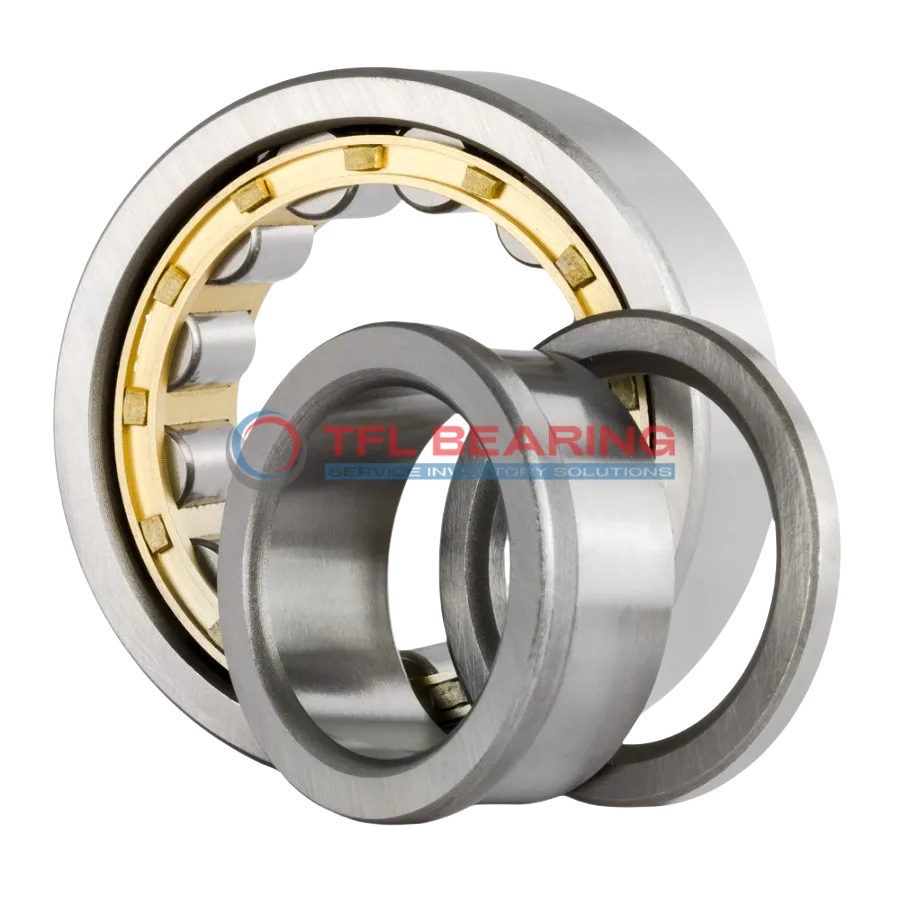
The NUP 220 ECML is a single row cylindrical roller bearing with a 100mm bore and 180mm outer diameter, crafted from sturdy chrome steel. It handles combined loads up to 64125 lbf and reaches speeds of 7000 RPM.
Its open design and PA66 cage ensure smooth operation, while the inner ring provides stability under heavy loads. The bearing works efficiently in temperatures from -30°C to 110°C.
This model is interchangeable with SKF bearings, making it a practical choice for replacements. Ideal for industrial machinery or gear systems where high radial and axial loads are present.
Weighing 4kg, it’s robust yet manageable for its size. Compliant with RoHS and REACH standards for safe and reliable use.
"*" indicates required fields
Performance Features of NUP 220 ECML Bearing
NUP 220 ECML Bearing is built with chrome steel rings and rollers, offering strong resistance to combined loads.
Its dynamic radial load capacity reaches 64,125 lbf, ensuring reliable performance in demanding conditions.
The PA66 cage keeps the rollers centred, reducing friction and extending service life.
With a maximum speed of 7,000 rpm, it balances durability and efficiency.
How Does NUP 220 ECML Bearing Reduce Friction?
NUP 220 ECML Bearing features a precision-engineered single-row cylindrical roller design for smooth operation.
The chrome steel rollers and raceways minimise friction, even under heavy radial loads.
Its open design allows for easy lubrication with grease or oil, enhancing performance.
The PA66 cage ensures proper roller alignment, further reducing wear and tear.
Engineered for Precision: NUP 220 ECML Bearing
NUP 220 ECML Bearing is designed for high-precision applications with tight tolerances.
Its chrome steel construction provides excellent durability and resistance to wear.
The bearing handles combined loads efficiently, making it versatile for various uses.
With a temperature range of -30° to 110°C, it performs reliably in diverse environments.
Steel vs Ceramic Bearings: Strengths of NUP 220 ECML Bearing
NUP 220 ECML Bearing uses chrome steel for both rings and rollers, ensuring robust performance.
This material choice provides excellent load capacity and resistance to fatigue.
The bearing’s design allows for easy axial displacement, accommodating thermal expansion.
Its open construction simplifies maintenance, making it a practical choice for many applications.
What Makes NUP 220 ECML Bearing Suitable for High-Temperature Applications?
NUP 220 ECML Bearing operates reliably in temperatures ranging from -30° to 110°C.
Its chrome steel construction maintains structural integrity even under thermal stress.
The PA66 cage material is chosen for its stability in varying temperatures.
This makes the bearing ideal for environments with fluctuating heat conditions.
Industrial Uses of NUP 220 ECML Bearing
NUP 220 ECML Bearing is commonly used in heavy machinery like gearboxes and industrial pumps, where its cylindrical roller design handles both radial and axial loads efficiently. The chrome steel construction ensures durability in demanding environments.
Where Is NUP 220 ECML Bearing Used?
You’ll find NUP 220 ECML Bearing in automotive applications such as transmission systems, where its high-speed capability and load capacity keep things running smoothly. The PA66 cage also reduces friction, making it a reliable choice for long-term use.
Built for Heavy-Duty Use: NUP 220 ECML Bearing
NUP 220 ECML Bearing excels in conveyor systems and material handling equipment, thanks to its robust design and high dynamic radial load capacity. The open seal type allows for easy lubrication, extending its service life.
Automotive vs Aerospace: Applications of NUP 220 ECML Bearing
In automotive settings, NUP 220 ECML Bearing supports drivetrain components, while in aerospace, its precision and reliability make it suitable for auxiliary systems. The metric sizing ensures compatibility across various industries.
Perfect Fit for Automation: NUP 220 ECML Bearing
NUP 220 ECML Bearing is ideal for robotic arms and automated production lines, where its combined load handling and high-speed performance are essential. The temperature range of -30° to 110°C ensures stability in diverse operating conditions.
"*" indicates required fields